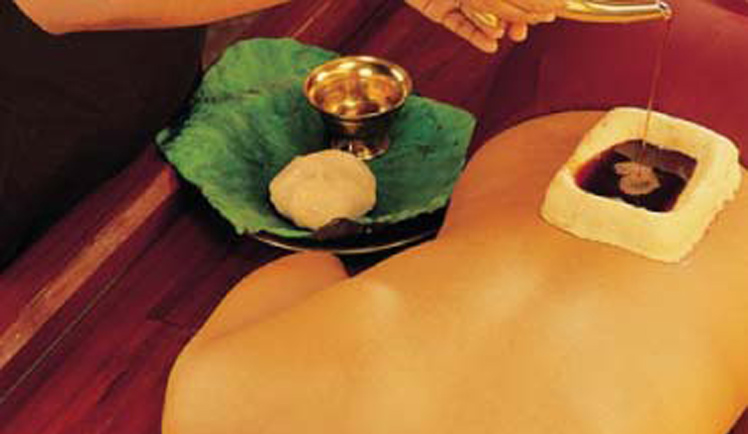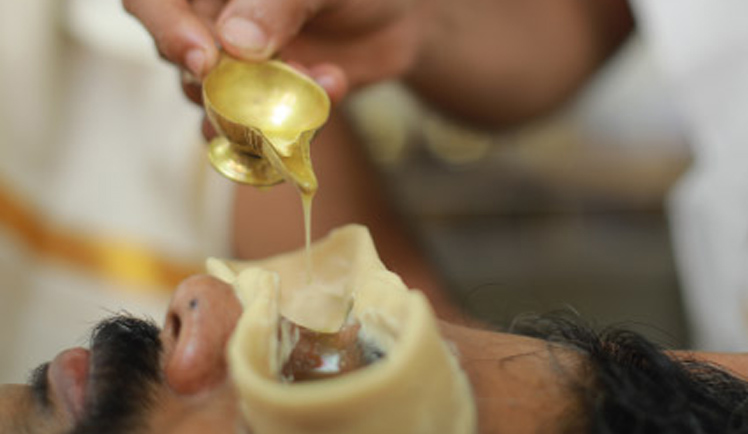
Ayurveda Panchakarma Treatment
Panchakarma will remove the excess doshas and correct imbalances in them as well as eliminate the harmful ama out of your system through the body’s own organs and channels of elimination (colon, sweat glands, lungs, bladder, urinary tract, stomach, intestines, etc). Panchakarma purifies the tissues at a very deep level.
It is a very pleasurable experience that is tailored to individual needs and may involve:
Daily warm oil massage (abhyanga)
Herbal steam therapy (swedana)
Lymphatic massage
Herbal enemas (basti)
Nasal administrations (nasya)
Other special treatments
Ayurveda recommends Panchakarma as a seasonal treatment for maintaining mental and physical hygiene and balance.
Panchakarma is a five-fold therapy; it is highly individualized based on the needs of the individual depending on the Ayurvedic constitutional type, doshic imbalances, age, digestive strength, immune status, and many other factors. Depending on each individual’s needs, all or only parts of the five therapies are utilized. Specially trained therapists must administer these procedures in an exact sequence for a specified period of time. In addition, although Panchakarma is, for the most part, a delightful and comfortable therapy, there can be periods of discomfort associated with the profound release of toxins, which does occur. It is therefore essential that a knowledgeable expert who can recognize the signs of properly and improperly administered Panchakarma supervise the therapy. Fortunately, these signs were meticulously recorded by the ancient vaidyas.
Like all medical procedures, Panchakarma Therapy always must begin with an initial consultation by a qualified Ayurvedic Physician who can determine the individual’s Prakriti (constitutional type), the nature of the health problem (if any), and the appropriate degree of intensity of the prescribed therapies.
Panchakarma treatments have been shown to create measurable brain wave coherence and to lower metabolic activity. They allow the body and mind to drop into a profound level of peacefulness. In this state of relaxation, it is possible to cleanse toxins from tissues as well as to release deeply held emotional tensions.
Panchakarma Detoxifies the Body and Mind
According to Ayurveda, good health depends upon our capability to fully metabolize all aspects of life, assimilating that which nourishes and eliminating the rest. When we can’t completely digest our food, experiences, and emotions, toxins accumulate in our bodily tissues, creating imbalance and – ultimately – disease. Panchakarma is an elegant cleansing process that releases stored toxins and restores the body’s innate healing ability.
When our digestive energies, known as Agni (fire), are robust, we create healthy tissues, eliminate waste products efficiently, and produce a subtle essence called Ojas. Ojas, which may be envisioned as the innermost sap of our psychophysiology, is the basis for clarity of perception, physical strength, and immunity. On the other hand, if our Agni is weakened, digestion is incomplete and creates toxins that get stored in the body. This toxic residue is known as Ama.
The Foundation for Health and Well-being
When ama accumulates in the body, it blocks the flow of energy, information, and nourishment throughout the system. Ayurveda considers this build-up of toxins the underlying cause of all disease. A common example of this is the accumulation of saturated fat and cholesterol that is beyond the body’s capacity to metabolize. Over time, this leads to the blockage of the blood vessels and arteries and, ultimately, to heart attacks.
While it’s easy to understand Agni and ama in terms of food, it’s important to remember that your mind and heart are continually digesting energy and information as well. Right now your mental digestive powers are working right now to break down these ideas into components that your intellect can assimilate. Similarly, your emotional Agni is responsible for processing your experiences and feelings, including the smile of a loved one, unexpected criticism at work, or the excitement of a new relationship.
Restoring the Body’s Natural Balance
If your emotional Agni is strong, you are able to extract whatever is nourishing and eliminate the rest. The inability to metabolize emotions, however, produces just as much toxic residue as undigested food. In fact, pent-up anger, long-held sadness, and lingering guilt are more debilitating for most people than problems with physical digestion.






